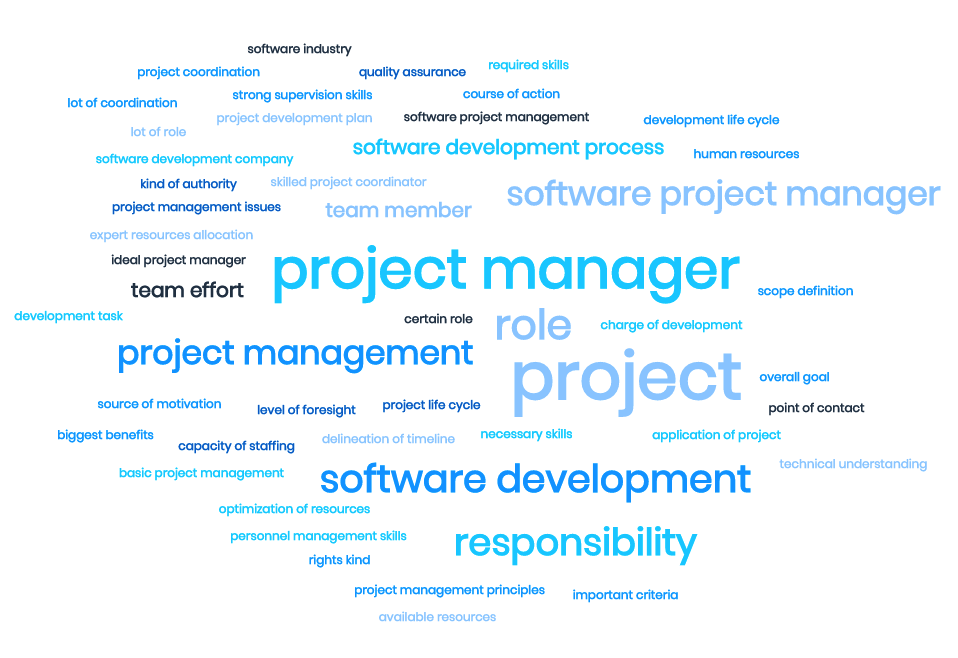

Software project management got its start in the late 1980’s as the software industry started to take off. These early projects lacked a key figure who could oversee the work and coordinate tasks across departments. To get around this, companies hired an individual with both the authority and the technical understanding of the end goal and to be in charge of development.
More than thirty years on and PMs still bring similar skills to software development. At its most basic project management is about organizing work, setting priorities and keeping everyone in line. But the role is so much more than that. PMs have to deploy all the necessary skills to complete a project successfully. They don’t just relay directions from a client to developers, but also have to inspire and motivate a team, keep everything on track and make sure to deliver a successful project in the end.
Projects require a team effort, and just like all other team efforts, there needs to be a central figure to be accountable. This person has to direct and instruct team members to reach a goal. Failure to motivate a team or to communicate effectively can lead to a breakdown in the project. This is something you really want to avoid in development, both for runaway costs and lost productivity.
Scott Berkun, author of Making Things Happen, compares PMs to doctors. “A project manager,” he said,” is like a doctor who leads the trauma team and decides the course of action for a patient — both at the same time. Without the right kind of authority to efficiently handle all the project management issues, development teams can easily get into trouble.”
It’s the main reason why you want a project manager on your team — you don’t have time to waste and someone has to break a large, complex task into smaller tasks and keep the workflow going.
Project Manager in Software Development
Software project managers oversee and prioritize development tasks and communicate with clients. This involves the application of project management principles, such as identifying blockers, keeping team members accountable, effective communication and giving feedback.
So what are the responsibilities of a software project manager?

1. Scope Definition
One of the chief responsibilities of a software project manager is to define the scope of the project. Software development won’t be successful without a clear delineation of timelines, schedules, project styles to use, projections, available resources, and overall goals.
It’s the responsibility of a project manager, with the help of a capable team, to set these clear terms at the beginning, at regular intervals, and to revisit the terms at the end of the product development life cycle.
2. Project Coordination
A project manager is expected to be able to coordinate company resources and that of third parties to ensure that the project is carried out perfectly.
The scope of this involves making sure that all projects are delivered on schedule while ensuring that the expended resources keep with the scope of the project and that expenses remain within the budget.
3. Resource Allocation
To successfully manage resources, a project manager has to be able to delegate resources efficiently to maximize output while minimizing waste. Part of the responsibilities of a project manager in software development is expert resource allocation.
4. Change Management
Expectedly, there will be unforeseen circumstances that make changes to a project plan necessary. It is a project manager’s responsibility to spot those changes early and address them. This requires some level of foresight, and the ability to be flexible and adapt to necessary changes, even when these changes are not the most convenient option.
5. Project Execution
And of course, a project manager is expected to be able to execute a project. It’s the combined responsibilities of a software project manager, which is to ensure that a project comes to a successful close.
Roles of a Project Manager in Software Development

A project manager has to take on a lot of roles. The reason why a project manager is such an important player in the software development process is that they play the role of more than one professional. This is why versatility is a key skill in choosing an ideal project manager. Because the role of a software project manager is like being the owner of a project, the ideal candidate for the role needs to know a little bit about everything that goes into the project.
Some roles of a project manager in software engineering are:
1. Planning and Organizing
A project manager both plans and organizes the software development process. While this is never a one-person job and the help of a team is always required, a project manager remains at the center of all the planning and organizing that goes on during the periods leading up to and in the course of any project.
2. Coaching
As mentioned earlier, a project manager needs to know a little bit about everything. This is because you may sometimes have to onboard new developers to a project and explain where the last person left off. You also need to know what their job entails to be able to stand in as a coach and lend them a helping hand or serve as a guide.
Motivation is also a big part of running any project successfully. On average, projects often carry on for weeks, and sometimes, even months. In that time, employees are likely to get frustrated or demotivated, especially if the project is running into roadblocks. Like any coach, a project manager would also have to stand in as a source of motivation to bring morale back up.
3. Supervising
A project manager oversees all the operations going on across all the departments during a project life cycle. This means a lot of coordination across teams. Front end, back end, design and quality assurance all need alignment. The PM is often the one to make sure it happens. Strong supervision skills are an important criterion for hiring any project manager.
4. Staffing
Staffing is the process of recruiting workers by assessing their knowledge and skills before onboarding and delegating tasks. A project manager needs to have human resource and personnel management skills to serve in the capacity of staffing, this means they must understand the required skills to fill certain roles and what traits to look out for in each recruit.
5. Project Management
It is a no-brainer that a project manager should know how to manage projects. It is the overarching innate ability of a skilled project coordinator to be able to oversee each cog that makes up the wheel of a project by managing human, time, and financial resources efficiently. This is the ultimate role of a project manager — to see a project out to completion.
Conclusion: Why it is important to have a project manager in your software development company

A project manager is an asset to any company’s project development plans. Because of the multi-faceted nature of the roles and responsibilities of a software project manager, having one handling the affairs of a project’s life cycle is important for several reasons.
One of the biggest benefits that a project manager can bring to your product is the optimization of resources. Having one skilled hand with extensive expertise in project development ensures that you save time and cost through the authorization of a professional to help manage resources, set milestones, and oversee timelines.
Secondly, a project manager helps bridge any communication gaps that might exist between your company, the team working on the project, and the stakeholders. A project manager serves as that point of contact between all relevant parties, corresponding with all involved members, making sure everyone is clear on what the status of the project is, what progress has been made, and what hurdles have been encountered in the course of the project.
The end of a project doesn’t spell an end to a project coordinator’s relevance. Your company still needs a project manager even at the close of a project for revision and documentation purposes. A project manager checks that all goals have been achieved and takes note of the lessons that have been learned while helping to put in place proper structures to ensure that your company’s next project is a successful one.
Project management is serious business, and it should always be put in the hands of a competent, trusted professional.
Let's chat!
 Hi, I’m Marcin, COO of Applandeo
Hi, I’m Marcin, COO of Applandeo
Are you looking for a tech partner? Searching for a new job? Or do you simply have any feedback that you'd like to share with our team? Whatever brings you to us, we'll do our best to help you. Don't hesitate and drop us a message!
Drop a message